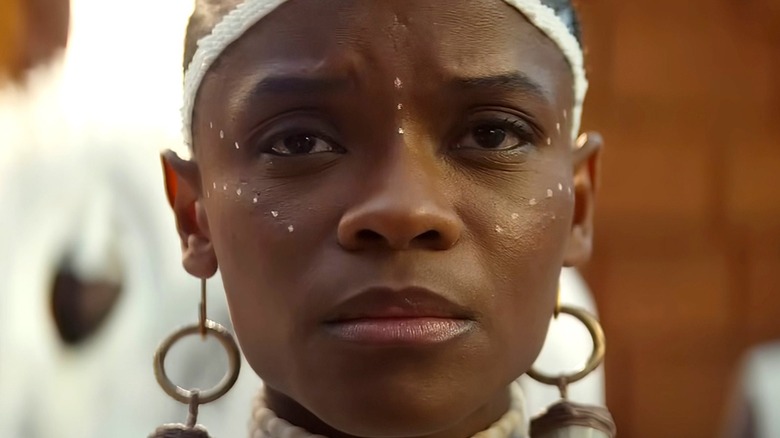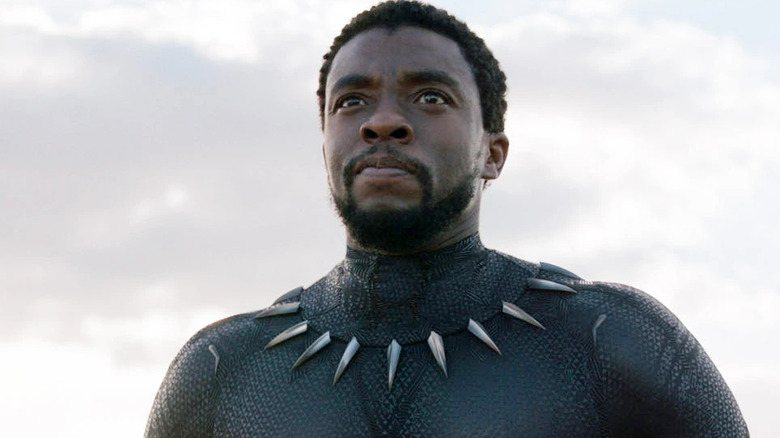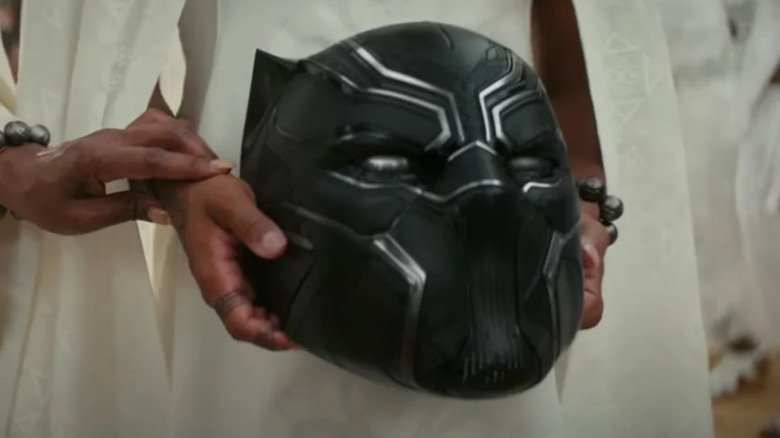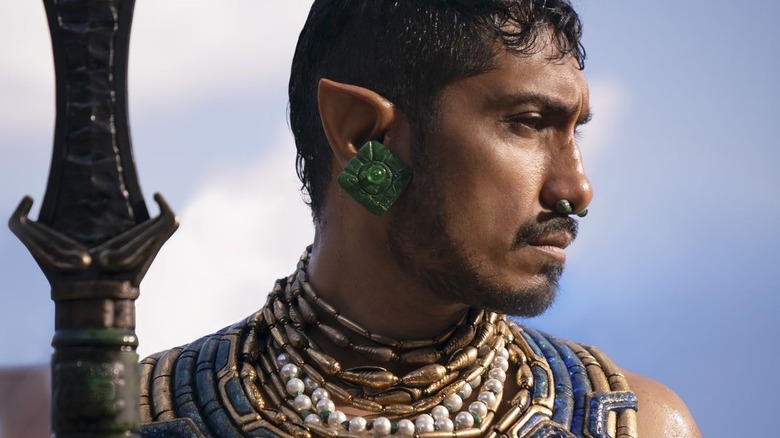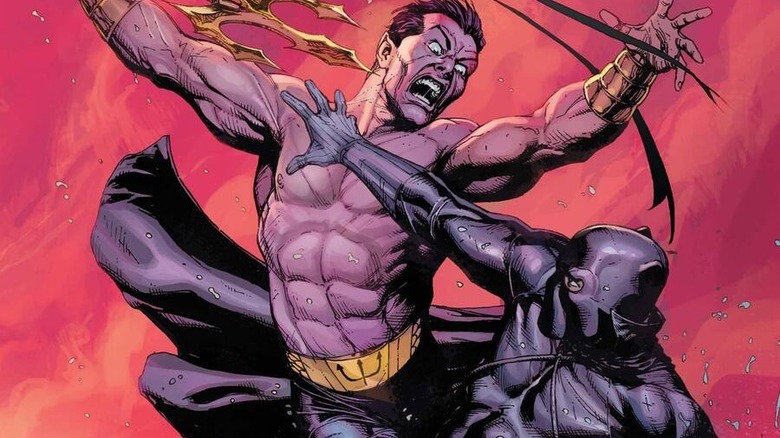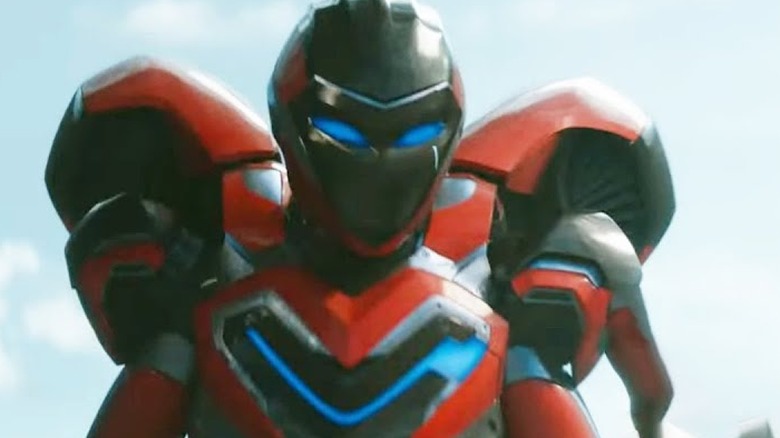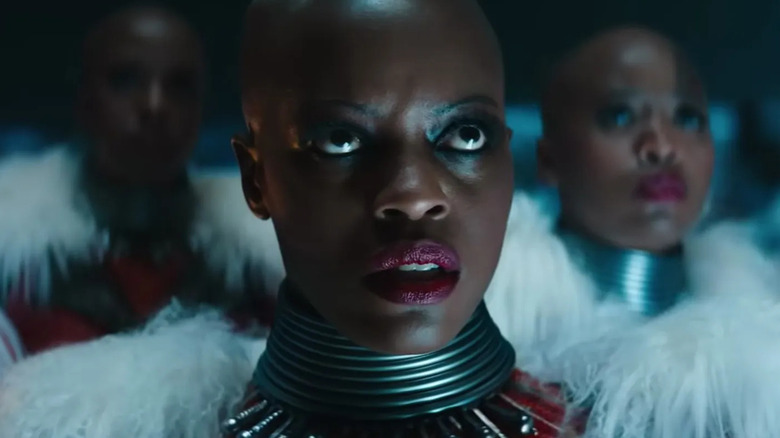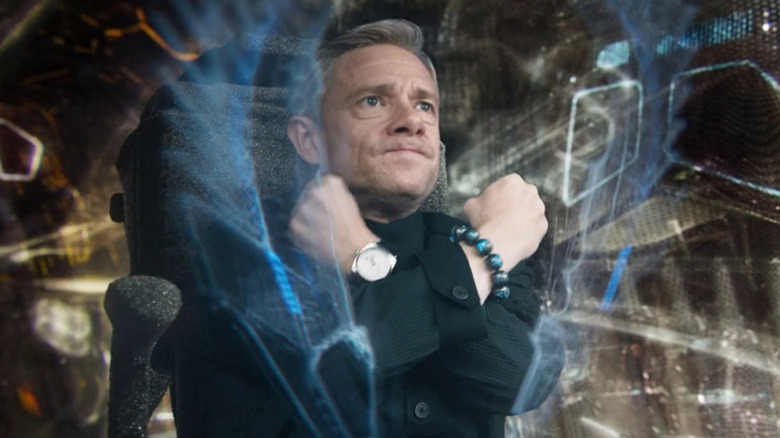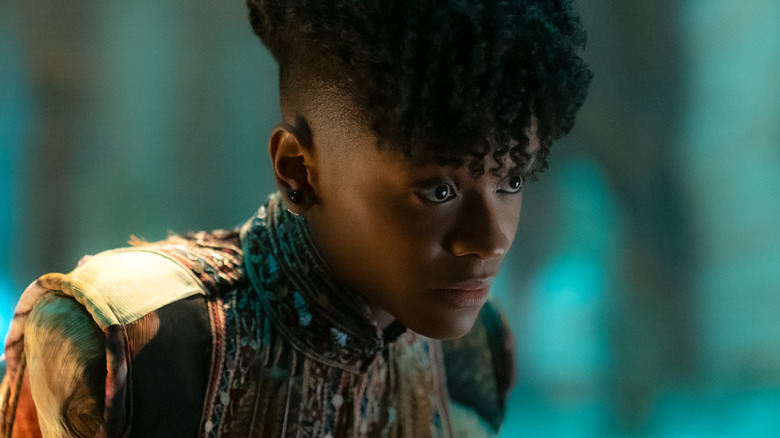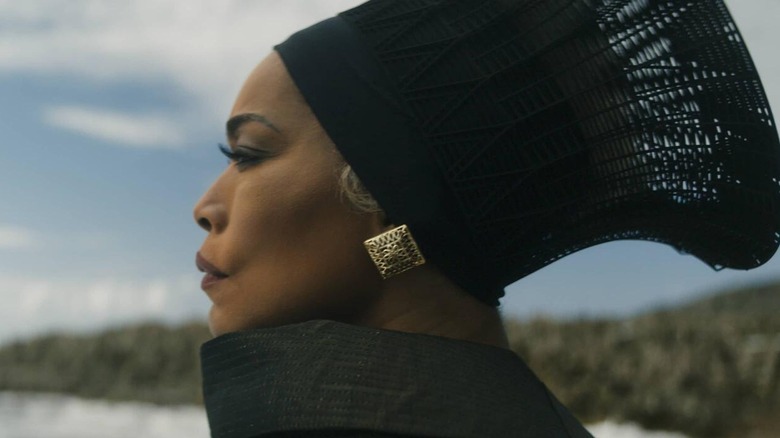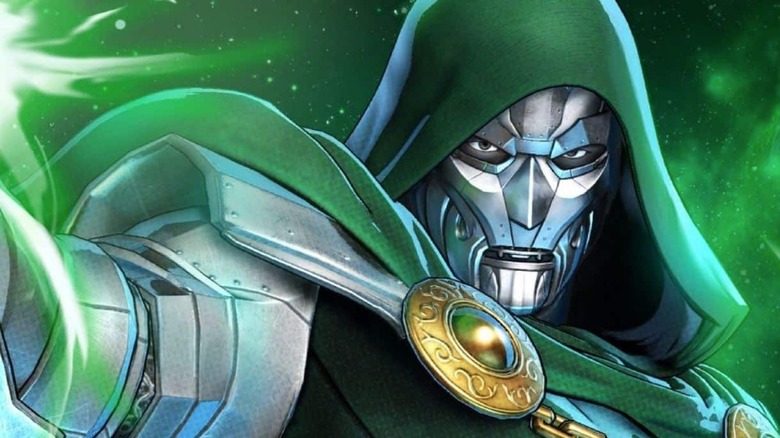Black Panther: Wakanda Forever Moments That Upset Fans The Most
Contains spoilers for "Black Panther: Wakanda Forever."
The Marvel superhero Black Panther — aka King T'Challa, leader of the secret technologically-advanced African nation of Wakanda — first made his live-action debut in the Marvel Cinematic Universe during 2016's "Captain America: Civil War," played to perfection by rising star Chadwick Boseman ("42"). The character then received his long-awaited solo outing in 2018 from director Ryan Coogler ("Fruitvale Station"), who co-wrote the script with Joe Robert Cole. The film immediately became a massive cultural phenomenon for its rousing action, its captivating drama, and its incredibly talented ensemble of Black actors.
Boseman would reprise his role in "Avengers: Infinity War" and "Avengers: Endgame," and voice an alternate version of T'Challa in the Disney+ animated "What If?" series. Then, his death from cancer in 2020 left the character's future in question. Coogler and his team, already working on a solo sequel, had to rethink an initial concept following T'Challa coming back from The Blip and finding a way to manage both his superhero and kingly duties (via Inverse).
Now the long-awaited follow-up, "Black Panther: Wakanda Forever," is here, and fans have been raving (and ranting) about the film. While most loved it (just see the Rotten Tomatoes scores), there's been no shortage of critique. A lot of the complaints are quite unfounded, as we'll see, though some are definitely more reasonable than others.
Not recasting T'Challa
Chadwick Boseman's death on August 28th, 2020 devastated fans the world over. It also led the filmmakers inexorably toward a key issue many fans had with the film –- Ryan Googler and Kevin Feige's staunch refusal to recast T'Challa in the sequel.
"It just felt like it was much too soon to recast ... as extraordinary and fantastical as our characters and stories are, there's a relatable and human element to everything we do," Feige stated in an interview with Empire. "The world is still processing the loss of Chad." Boseman made T'Challa an icon and a role model to many, with the actor himself just as entangled with the character as Robert Downey, Jr. and Chris Evans have been with Iron Man and Captain America, respectively.
Nonetheless, there are still a lot of fans who were not just disappointed, but outraged by the idea of a "Black Panther" movie with no T'Challa, even knowing that the role would have to be recast to make it happen. For instance, Twitter user @KjStarwalker wrote, "We had one black male super hero ... and yall killed him after one movie." And, as @LeoWukong points out, it's not like the MCU hasn't recast before, with Don Cheadle taking over the role of War Machine from Terrance Howard and Harrison Ford set to replace the late William Hurt as General "Thunderbolt" Ross in the upcoming "Thunderbolts."
The anticlimatic death of T'Challa
Boseman's death necessitated a vastly different approach to the sequel's story, especially considering that -– despite the option being on the table -– writer-director Ryan Coogler decided not to recast the hero. This meant that a different character would have to take the mantle, which ended up falling to T'Challa's super-genius scientist sister, Shuri (Letitia Wright).
Of course, for that plot to work, the movie would also have to explain T'Challa's absence. And since they didn't have a way to have Chadwick onscreen to do it himself -– and luckily opted not to do any dead-eyed CG or deepfake nonsense -– it meant they instead decided to have the character of T'Challa die off-screen. To be fair, there was no real way to do that completely satisfactorily, especially without Boseman or the willingness to use a stand-in, so Coogler made the wisest decision he could by having the death happen quickly at the beginning of the film. At the same time, the plot metatextually hearkens back to Boseman's real-life death by having T'Challa succumb to a disease.
However, many fans were understandably upset by this, including Twitter user @Nuecents37, who brings up the fact that Wakanda's super science seems advanced enough to cure pretty much any mortal illness. After all, in the comics, the Black Panther is immune to disease. It's also just very anti-climatic, in general, to have your lead character die off-screen. However, it's undeniable that there were no great options for Coogler here.
Namor not being Atlantean
One of the highlights of "Black Panther: Wakanda Forever" is the live-action reveal of the classic Marvel anti-hero Namor, played to perfection by Mexican actor Tenoch Huerta, who has been justifiably outspoken about colorism and discrimination in the entertainment industry. Even better, the character is also very comic book accurate in his appearance, down to Namor's patented pointy elf ears, skimpy green trunks, and even the goofy wings on his feet that let him fly. Basically, Ryan Coogler was able to make Namor work as a compelling and cool character on screen, despite all the ways the character could've gone wrong. Namor even yells out his comic book battle cry of "Imperius Rex" during the climax of the film.
However, one of the big changes the film makes to Namor's backstory is the fact that, instead of being from Atlantis, Namor hails from the Mesoamerican-inspired fallen kingdom of Talokan, based (very loosely) on Aztec mythology. Now, there were a variety of reasons for the change from the source material, including possibly to avoid comparison to DC's blockbuster Aquaman movies starring Jason Mamoa. Also, it's a nice way to add more diversity and representation to the MCU, and the superhero movie landscape in general.
Unfortunately, while most fans appreciate the MCU adaptation of Namor's backstory, some were not so happy about the change in canon, such as Twitter users @kmele and @PestJungfrau. There's just no pleasing some people who've grown attached to every detail of comic book lore.
Namor yielding
Most fans of "Black Panther: Wakanda Forever" appreciated the change to Namor's backstory, especially in how it allowed more Indigenous representation to be included in a blockbuster superhero film. However, even some of those fans, who appreciated what Feige and Coogler had in mind for the MCU's version of Namor, had other issues with how the character was portrayed in the "Black Panther" sequel.
For instance, in the original Marvel comics, Namor is known for being stubborn, strong-willed, and a bit of a Lothario. While a lot of that is still intact in the cinematic version, some vocal fans were disappointed with how he was so easily defeated in the end. Admittedly, some of that stems from sexist reasons for believing that Shuri shouldn't have been given the Black Panther mantle, but other fans have made more cogent points. As Reddit user Jex93160 wrote, "If Namor carried a bottle of water with him, he would be invincible. Also, why didn't he go take a sip of water when Shuri was stunned before starting the fight?" Not a bad point.
Also, while he and Shuri certainly seemed to have some chemistry as he showed her around Talokan, he's not as overtly leery as he is in the source material. Of course, that's probably a good thing, all things considered.
The CG is still problematic
The original 2018 "Black Panther" film is rightfully heralded as not only a great Marvel movie and an outstanding superhero film, but as simply a good film in general. It can even count a nomination for Best Picture at the 2019 Academy Awards among its many accolades. However, despite the praise from critics and fans alike (via Rotten Tomatoes), the somewhat janky CGI was always a big and consistent complaint lobbied at the film. And it's not exactly unfounded, either, especially during the final fight between T'Challa and Michael B. Jordan's Killmonger underneath Wakanda, which sometimes borders on Playstation 3 cutscene levels of quality.
To be fair, this issue isn't a problem with "Black Panther: Wakanda Forever" specifically, as a lot of recent blockbusters have been burdened with an overabundance of shoddy VFX work. This, of course, is an industry-wide problem exacerbated by the number of VFX shots in blockbuster films and TV shows increasing exponentially, as a lack of unionization in the effects industry leads to burnout and the bleeding of talent (via Gizmodo). Regardless, this practice is especially an issue in the MCU in particular.
Nonetheless, none of this changes the fact that a lot of the CGI in "Black Panther: Wakanda Forever" feels definitely undercooked, with fans like TikToker @beyondverse_ comparing Riri Williams' (Dominique Thorne) overly-shiny Ironheart armor to the Power Rangers. Honestly, it's a point that's hard to argue with, despite Ironheart's otherwise welcome addition to the cast.
An overly oppressive tone
One of the chief complaints lobbed at the Marvel Cinematic Universe, especially since 2012's "Avengers," is the overly quippy and self-referential "Whedon-speak" (via Vice). Worse, that kind of patented overly snarky and irreverent dialogue that the MCU has traded in for over a decade has been seeping into other movies as well, becoming the de-facto mode for way too many blockbusters.
This, of course, has led to an inevitable backlash towards the MCU by critics and fans alike, especially considering its tendril-like ubiquity practically pervading the entire entertainment industry. Fans eventually started complaining about how the MCU now had far too many jokes, the stakes started to feel non-existent, and every character had the same quippy attitude, despite their disparate backgrounds and origins. Luckily, many fans were happy to discover that "Black Panther: Wakanda Forever" had a much more somber and serious tone –- which makes sense, considering the entire film is grappling with heavy topics like grief, the devastating effects of imperialism, and the death of its previous star hanging over it.
Unfortunately, some fans didn't appreciate the change in tone, or –- at the very least -– didn't appreciate just how dark and oppressive it got. Twitter user @MatteoFalato, for instance, wrote that "the mood was too serious," while another Twitter user, @skyswalkerleia, comedically showcased the change in tone and perspective between the two "Black Panther" films. There was probably no way, given the unfortunate behind-the-scenes circumstances of the film, that "Wakanda Forever" would be as fun as the first "Black Panther." However, it also makes sense that a certain number of fans would rather have come to watch an escapist fantasy, rather than a sobering meditation on grief and loss. To each their own.
Good guy CIA guy being imperialist propaganda
Another of the small handful of criticisms faced by the first "Black Panther" film regarded the inclusion of a "good guy" CIA agent, Everett K. Ross (Martin Freeman). As most people should be aware of by now, the CIA has been at the forefront of toppling many democratically-elected governments in the Global South (via The New Yorker). This has particularly affected nations in Africa and Central and South America — cultures that Wakanda and Talokan are obviously inspired by — as the U.S. has played a part in stripping those nations of their natural resources (not too dissimilar to Western nations' desire to obtain Vibranuim in the films).
In fact, even the "Black Panther" films in the MCU don't necessarily shy away from agency's terrible and imperialist atrocities (which are still happening to this day, via Michigan Daily). Furthermore, it's a major plot point in "Black Panther: Wakanda Forever" that the U.S. government, operating via Agent Ross' ex-wife, CIA director Valentina Allegra de Fontaine (Julia-Louis Dreyfus), is behind a plan to steal both Wakanda and Talokan's Vibranium by any means necessary.
Twitter user @JoseMLuna stated the issues with the film's political framing pretty plainly in an insightful tweet: "Absolutely hilarious how Wakanda Forever seamlessly goes from ... 'this dangerous indigenous extremist wants his land back, that's messed up' to 'anyway, let's check in with our lovable CIA scamp.'" Oof. This is not to say that there isn't any nuance in Coogler and the MCU's depiction of the CIA, but it could still do better in grappling with the issue.
Letitia Wright's alleged anti-vax and transphobic behavior
To get this out of the way upfront: When it comes to playing Shuri's journey through grief to her acceptance of the mantle of Black Panther, Letitia Wright absolutely kills it in "Wakanda Forever." She more than steps into the Vibranium shoes left by Chadwick Boseman as she showcases a wide range of emotions while handling the action scenes with immense skill. Not only is she asked to do more than in her previous appearances in the MCU, but she nails every aspect of her performance with aplomb.
Outside the movie, though, it's been disheartening for many fans to find out that between "Black Panther" and "Wakanda Forever," Wright took to spreading anti-vax and bigoted anti-trans conspiracy theories, as outlined by Vulture. Upon facing backlash for her comments, she only doubled-down, rather than apologizing or retracting them. There's also evidence that she was allegedly responsible for a massive COVID scare on the "Wakanda Forever" set (via The Hollywood Reporter).
Because of this, some fans understandably struggled to separate the actor from her character, such as Twitter user @Damac1214, who wrote, "it's a shame Letitia Wright had and seemingly continues to have that anti-vax controversy considering Shuris [sic] arc in Wakanda Forever is perfect and she gives an incredible performance that I really wasn't expecting from her."
The death of Queen Ramonda
The cast member who stands out most of all in the "Black Panther" films –- and who frankly elevates any film she happens to appear in -– is Angela Bassett ("What's Love Got to Do With It?"), who plays T'Challa and Shuri's mother, the wise and regal Queen Ramonda.
In "Black Panther: Wakanda Forever," Bassett's Queen Ramonda has taken over diplomatic affairs for Wakanda after T'Challa's untimely death, as powerful Western nations like France and the United States attempt to undermine Wakanda's sovereignty and gain access to their Vibranium. These attempts lead those governments to the ocean, where they find Namor's kingdom of Talokan. Unbeknownst to the rest of the world (including Wakanda), Namor's people have their own reserve of Vibranium as well. Because of this, Namor attempts to garner a truce with Wakanda, which doesn't go well, and eventually Namor attacks Wakanda and drowns Queen Ramonda to death.
Now, unlike a lot of the previous entries, this one was an intentional move by the filmmakers to make viewers upset. The sadness and melancholy was the desired effect Ryan Coogler wanted, and he certainly did succeed if social media is anything to go by. Just see the reaction from Twitter users like @JayBoatman123, whose perfect post depicts someone crying inconsolably, while stating "QUEEN MOTHA GET UP" in all caps. We agree, @JayBoatman123. We agree.
No after credits stinger with Doctor Doom
Unlike most films in the Marvel Cinematic Universe, "Black Panther: Wakanda Forever" doesn't have an after credits sequence. In fact, it's one of the only films in the entire MCU to not have an after credits sequence, with the others being "The Incredible Hulk," "Avengers: Age of Ultron," and "Avengers: Endgame" ("Avengers: Endgame" is the only MCU movie to not have a mid-credits scene either). To be clear, there is a mid-credits sequence in "Wakanda Forever," which is a beautiful and emotional coda in which Shuri is then greeted by Nakia (Lupita Nyong'o) and the son she secretly had with T'Challa (young actor Divine Love Konadu-Sun). He's named after his father, possibly setting him up to reclaim the Black Panther mantle in later sequels.
All of that aside, there was a persistent rumor from legitimate outlets like The Hollywood Reporter that none other than Victor Von Doom was going to be introduced in an after-credits stinger at the end of "Black Panther: Wakanda Forever." Now, this could've been true at one point, but then changed to let the Black Panther film end on hope and renewal. Or the rumors were unfounded and he was simply never intended to appear at all. Either way, the iconic Marvel villain does not in fact appear in "Black Panther: Wakanda Forever," and there was never any guarantee he would. That didn't stop certain fans from getting upset, including Twitter users like @ErenJaeger428 and @AlecDrakeThe1st, with the latter depicting someone putting on clown make-up and crying. Better luck next time.
